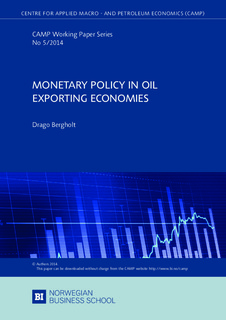Monetary Policy in Oil Exporting Economies
Working paper
Permanent lenke
http://hdl.handle.net/11250/223213Utgivelsesdato
2014Metadata
Vis full innførselSamlinger
Sammendrag
How should monetary policy be constructed when national income depends on
oil exports? I set up a general equilibrium model for an oil exporting small open
economy to analyze this question. Fundamentals include an oil sector and domestic
non-oil firms – some of which are linked to oil markets via supply chains. In the
model, the intermediate production network implies transmission of international
oil shocks to all domestic industries. The presence of wage and price rigidities
at the sector level leads to non-trivial trade-offs between different stabilization targets.
I characterize Ramsey-optimal monetary policy in this environment, and use
the framework to shed light on i) welfare implications of the supply chain channel,
and ii) costs of alternative policy rules. Three results emerge: First, optimal policy
puts high weight on nominal wage stability. In contrast, attempts to target impulses
from the oil sector can be disastrous for welfare. Second, while oil sector activities
contribute to macroeconomic fluctuations, they do not change the nature of optimal
policy. Third, operational Taylor rules with high interest rate inertia can approximate
the Ramsey equilibrium reasonably well.
